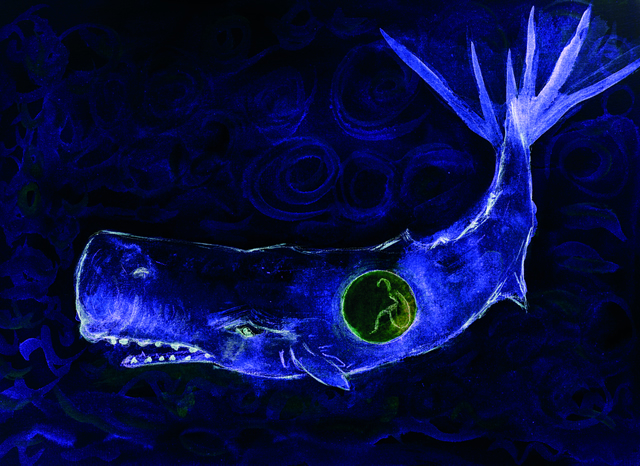
The Prophet Jonah and the Coronavirus
What does the prophet Jonah have to do with the coronavirus? It’s not as if there are any hidden hints of the coronavirus to be found in the Book of Jonah. Such an oracle or a “reading between the lines” has nothing to do with a serious interpretation of Scripture. It’s about our own lives.
While reading the book of Jonah, what moved me in regard to the coronavirus is the end of the story in chapter 4. In it, we find a prophet who is vexed about God’s absent judgment on Nineveh. And that’s not all. At the same time, his own wellbeing was more important than the deliverance of more than 120,000 inhabitants of that city. So first, he built himself a shelter—a form of “social distance,” where he could view the coming judgment from a safe spot. In self-imposed quarantine under its shadow, he was able to feel better than under the scorching Assyrian sun. And then God even caused a castor oil plant with large leaves to grow, so the prophet had even more shade. There in his comfortable oasis, his emotional temperature rose from frosty to well-tempered on the spot. While Jonah felt completely at ease and spiritually far enough away from the Gentiles in Nineveh, he kept waiting for God’s judgment. But fire didn’t rain down on Nineveh. Instead, the sun burned the prophet’s head with all its power after God withered the shady tree with an oppressive east wind. Despite the high external temperature, the prophet’s emotional temperature again sank suddenly into frosty territory. Even worse, after Jonah’s comfortable oasis was destroyed and he felt the heat without protection, he became angry and wished that he would die. He was more concerned with the withered tree and his own well-being than with saving the people of Nineveh.
Currently, the coronavirus has suddenly changed a lot in our affluent Western nations. The advanced medicine we’re so grateful for hasn’t yet offered a panacea for Covid-19. This can be very distressing to people who are affected, and can even lead to death. But we haven’t just become aware of the fragility of health and life. The economic impact of the coronavirus measures shows the vulnerability of our prosperity, which we had believed to be safe. Formerly taken for granted, freedom of assembly for the church of Jesus collapsed overnight. Due to the current situation, we ourselves are in danger of becoming ill-tempered. In the face of possibly losing our own “shady castor oil tree,” we begin to grumble like Jonah at Nineveh.
What did God want to teach Jonah by withering the tree? Jonah was more concerned with his own well-being than God’s concern for the lost. He was angry about the loss of his comfortable oasis, whose creation he owed solely to the undeserved kindness of God. And what about us?
Haven’t the lost people around us faded into the distance, because of our prosperity and decades of religious freedom? We’re occasionally concerned for them, but overall, our primary concern is ourselves and our own well-being. Has increasing ungodliness led us to pray for grace in salvation for people ahead of God’s coming judgment? Or do we wish for God’s judgment upon them, so that we can otherwise devote ourselves to our self-satisfied “oasis existence”?
 What about the persecuted and suffering church of Jesus? Of course, comparing them to Nineveh’s inhabitants would be extremely strange. Rather, it’s more about our bubble of well-being that’s now beginning to burst, the seeming “shaded existence” that’s threatening to disappear. We may have prayed for oppressed Christians occasionally. But were their difficult circumstances really ever a constant concern for us? And then there are the many forgotten war and disaster zones around our globe. We’re occasionally touched and shocked by such reports, but we turn back to our self-satisfied “castor care” very quickly. Are we praying that people will be saved through the uncertainty and fear of the coronavirus situation? Or are we just praying that everything will get back to normal for us as quickly as possible?
What about the persecuted and suffering church of Jesus? Of course, comparing them to Nineveh’s inhabitants would be extremely strange. Rather, it’s more about our bubble of well-being that’s now beginning to burst, the seeming “shaded existence” that’s threatening to disappear. We may have prayed for oppressed Christians occasionally. But were their difficult circumstances really ever a constant concern for us? And then there are the many forgotten war and disaster zones around our globe. We’re occasionally touched and shocked by such reports, but we turn back to our self-satisfied “castor care” very quickly. Are we praying that people will be saved through the uncertainty and fear of the coronavirus situation? Or are we just praying that everything will get back to normal for us as quickly as possible?
When God let Jonah’s comfortable oasis wither, it allowed the prophet’s gaze to be redirected to God’s concern for and mercy toward lost people. Let’s consider the situation with the coronavirus in this context. Our deceptive world of wellbeing and “shaded existence”—being accustomed to prosperity—is suddenly beginning to wither. This should make the Lord Jesus’ concerns also become ours again, bringing us out of the isolation of our preoccupation with ourselves. Instead of talking smugly about the coming judgment, let’s do everything we can to see that people are saved. Hudson Taylor once emphasized the importance of the Great Commission in Matthew 28, by calling it the “last command of the risen One.”
The book of Jonah ends with God’s speech. We can assume that Jonah had to cope with his Lord’s words and actions. His place in the sun probably helped him to see things in the right light again. In the end, the fiery heat of the east wind probably kindled a new burning love for the lost in his heart. The people of Nineveh had repented. It took more than another 150 years before the following generations finally fell under God’s judgment, due to their renewed godlessness. If we watch the signs of the times carefully, it seems that we don’t have much time left. Everything indicates that Jesus will return soon. Therefore, let’s learn the “Jonah Lesson” that God’s Word is teaching us.
Midnight Call - 01/2021

